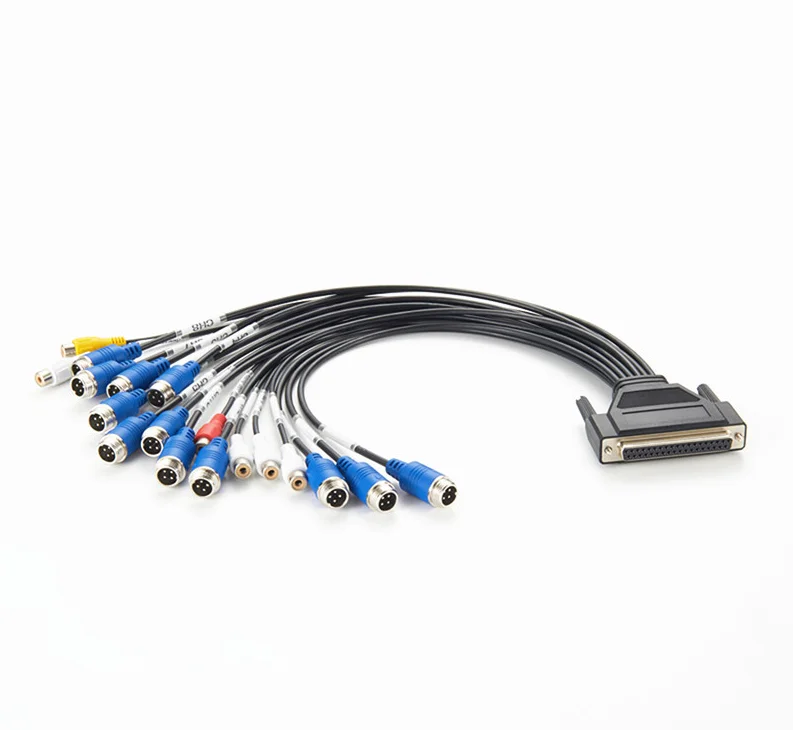Camera Link-kabels word die baie benodigde stroom in die industriële beeldvormings- en masjienvisie-wêreld, aangesien hulle hoogsnelheidsdata-oordrag tussen kamera's en raam-graspers of verwerkingseenhede moontlik maak. Hierdie komponente is nie net baie gespanne dele in enige verslaafde se stelsel nie, maar daar bestaan ook 'n groot kans dat ander belangrike dinge wat jy elders het, of uitval of regtig reg ingestel moet word in hul eie domein vir altyd. Sny nou vooruit na die huidige dag, en met al hierdie gevorderde tegnologie kom selfs meer sofistikeerde weergawes van hierdie stelsels – wat lei tot 'n variasie in hoe ons Camera Link-kabel bestuur. In hierdie pos, kabelorganisasie: nuwe opstel waar ek jou gehelp het om die beste kabel te kies vir 'n skoon begin en dan om seker te stel dat hulle in hul geweldige toestand bly.
Foto van Camera Link Kabelgids Vir Jou Toepassing
Hier begin al jou sukses met beeldvanger met die regte Camera Link kabel. Eerstens, let op die kabellengte: ná 'n sekere afstand kan seinintegriteit verswak. Oorskry nie die maksimumlengte van hierdie kabel nie, want dan sal jy begin om sein te verloor. 'n Ander aspek is die mate van beskerming wat die EEG-kabel skermsing bied, veral wanneer dit in elektriese lawwe omgewings bedryf word. Jy het 'n drievoudige skerm nodig om EMI-rebellie te voorkom. Dit moet verbindings hê wat by jou kamera en raam-verwener (MDR, HDR of SDR) pas. Soek ook moontlike toepassings wat dinamika vereis om slytsonderhou teen beweging of buiging te voorkom deur kabele te gebruik wat 'n lagere flex-lewe het.
Gedetailleerde Camera Link Opstelstappe
Oplossing: Maak jy nie oor hoe die fisieke buiging gered word nie, maak die verbindingskop skoon as daar roes is.
Kabelroutings : Die kabel moet sonder enige boog geleg word, sowel as ver van mechaniese spanning of ernstige termiese areas. Jy kan selfs 'n paar kabelbinders of sommige buise daaroor plaas as jy daardie ekstra stukkie gemoed wil hê.
Verbind die kabel aan jou kamera en raam-oorgewisselaar kanale aan beide kante sonder om dit te dwing nie, aangesien dit skade aan jou verbindinge kan berokken.
Inrush Stroom: Wanneer jy die stelsel weer aan skuif of 'n aansluitingsvolgorde uitvoer nadat die mag aan is, verseker jy altyd dat jy laast die kamera aanskakel, aangesien inrush strome sleg is vir hierdie toestel. Aan-skakel volgorde
Toets funksionele beeld oordrag: Bevestig dat jou beeldstelsel die ontvangst van beelde kan opspoor en kyk uit vir foute wat 'n verlies aan verbindingsvermoë aandui.
Lees Meer: Manier van Veragting en Volgsorg-Ordenisering Kaos in Jou PC Geval Rooi Tech Foute WaaromJyFout Maak By Bouwerkend Temp Sneloplossing Die INC Klassifikasie KategoriseringTechArtikel)
Vir die onderhoud van die lewe, en om seker te maak dat ons die beste diens kan verskaf vir toekomstige onderhoud, het al die kabels 'n goeie sorg nodig. As jy die kabels binne en in die kabelbakkie of -loper (via IER Photo Electric) organiseer, moet jou Data Center baie duidelik wees. Nie almal sal 'n kleurkodeerde kabel benodig nie, maar as hulle dit doen - deur verskillende tipes wat verskillende funksies uitvoer te gebruik, kan dit help om te identifiseer watter soort beheer jy aan die werk is sodat wanneer ure verloor gaan met die najaag van neersoekprobleme, verspil die prosesingenieur sowat min tyd daaraan en bring vinniger produksie terug online. Vir die spanningsoptog waar kable in behuisinge inset, verander rigting (bv. op regte hoeke), of om trilling tussen twee punte te absorbeer; 'n vorm van meganiese isolator wat in 'n slingkabelkonfigurasie gebruik word. Verifieer gereeld alle kabelroetes om seker te maak dat daar geen verplettering of skure plaasvind nie, en verplaas enige betrokke een wanneer daar twyfel bestaan voordat enige skade opperkom.
Tippies om kamera skakelkabels langer te laat wy
'n Bietjie reguliere onderhoud sou dit voorkom het en sal ook myle by jou kabels byvoeg asook sommige duurdown tyd bespaar. Implementeer 'n skoonmaakrooster Laat professionele skoonmakers modder en slym stof van verbindings eienskappe verwyder. Kontroleer regelmatig toerusting Hou en Vervang los, korrosie fase 3 inspekteer kabel Inspekteer vir toepaslike aapertuur om jou sein kwaliteit te handhaaf Draai Kabel Hê 'n kabel sirkulasieroopskema as moontlik, en draai dan ekstras wat jy gebruik in plek van wat werklik op die kabel is tydens dié tyd.
Nog een keer, die uitset moet Engels wees soos hieronder Basiese kamera skakel diagnostiek inkrementele optimering vir probleemoplossing.
Of as probleme voorkom, moet hulle sistematies opgelos word. Voordat dit kan lei tot beeldartefakte of 'n verloorde tydige gevoel, kontroleer ook die moontlikheid van 'n oop skakeling met los verbindinge en kabelskade. Die vervaardiger van jou frame grabber sal waarskynlik sommige diagnostiese gereedskap aanbied wat jou toelaat om die kwaliteit (en gewoonlik ook foutkontrole) te verifieer, afhangende van wat die skanner of sensaar is. Sommige mag 'n digitale kommunikasie-tips insluit soos 'n sein-kwaliteitstoetsaangawe. 'n Voorbeeld hiervan sal toets vir kruispraat en afzwakking. Dit kan beteken dat jy die kabels moet herorganiseer om hulle verder weg van bronne van storing te plaas, of moontlik beter EMI-skielings. As die probleem bly, praat dan met 'n kabel \/ kamera-vervaardiger vir verdere begeleiding of kyk moontlik na die aankoop van beter gebruikte kabele.
Uiteindelik kom alles hiermee neer op betroubaarheid en lewe van Camera Link-kabels. Volg hierdie beste praktyke om seker te maak dat jou beeldvormingstelsel vir 'n uitgebreide tydperk by topvlak presteer, wat stilstand minimaliseer en ROI maksimaliseer. Die dae toe jy net kon inset jou Camera Link-kabels alsof hulle sonder probleme sou werk nie, is verby, en nou leef ons in 'n tydperk wat presisie bo spoed voorplaat. Dus help die beste praktyke van versorging om betroubaarheid saam met beeldkwaliteit te verbeter.
Inhoudsopgave
- Foto van Camera Link Kabelgids Vir Jou Toepassing
- Gedetailleerde Camera Link Opstelstappe
- Oplossing: Maak jy nie oor hoe die fisieke buiging gered word nie, maak die verbindingskop skoon as daar roes is.
- Tippies om kamera skakelkabels langer te laat wy
- Nog een keer, die uitset moet Engels wees soos hieronder Basiese kamera skakel diagnostiek inkrementele optimering vir probleemoplossing.
 EN
EN
 AR
AR
 BG
BG
 HR
HR
 CS
CS
 DA
DA
 NL
NL
 FI
FI
 FR
FR
 DE
DE
 EL
EL
 HI
HI
 IT
IT
 JA
JA
 KO
KO
 NO
NO
 PL
PL
 PT
PT
 RO
RO
 RU
RU
 ES
ES
 CA
CA
 TL
TL
 IW
IW
 LT
LT
 SR
SR
 UK
UK
 VI
VI
 GL
GL
 AF
AF
 GA
GA
 CY
CY
 MK
MK
 HY
HY
 EU
EU
 BN
BN
 CEB
CEB
 NE
NE
 MY
MY
 SU
SU

